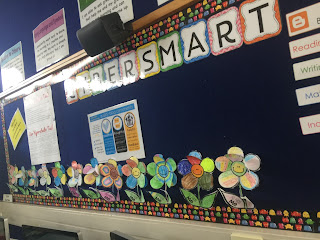After listening to the research feedback I had to think very carefully about my inquiry focus. As a school we are aware that the feedback suggest accelerate shift in reading but not as much shift in maths. This is why our inquiry focus this year is mathematics.
There are many factors that have influenced my think about my inquiry including, what Stuart McNaughton had said about interpersonal skills, key competencies and critical thinking and my dissertation in which I plan to focus on fluency video self modelling and peer feedback. This lead to think that feedback was a link between my dissertation and Stuarts ideas and that this could perhaps support critical thinking and discussion in mathematics.
This lead to my inquiry question: How does peer feedback affect progress in mathematics with my target group?
 |
| Peer feedback occurring in a maths group helping learners to form their picture of numbers and strategies. |
To start my inquiry I need to think about what this feedback looks like. I believe that it may be best in a discussion form in which student given feedback to each other including questions which opens up discussion about numbers and strategies.
I believe that the best way of achieving this discussion is to have open problems in which student work with different numbers (number that they choose from options given in context) using the same strategy. This allows them to given feedback around how they strategy worked and what they noticed about the numbers.
I still feel I have a lot of clarify to do and part of that process will be observing others to see how maths discussion happen around our school. This I hope will help me to develop my teaching to better support student voices in the feedback and discussion process.
It is also important that student share their maths on their blogs and that this is done creatively.
Some ideas I have around this at this stage are:
-Sketchnoting using google draw and/or pixlr
-Video descriptions of what they did and why
-using mini whiteboards and ipads to record problem solving.
- Audio/movie
- EE/educreations - Used to record thinking as group is working and solving.
I am excited to see how peer feedback can support discussion and build understanding in mathematics. I will keep you updated on my progress as I continue to inquire into my practice.





